Unit 5 Do you have a soccer ball? Section A (Grammar Focus-3c)课件(35张PPT)
文档属性
| 名称 | Unit 5 Do you have a soccer ball? Section A (Grammar Focus-3c)课件(35张PPT) |
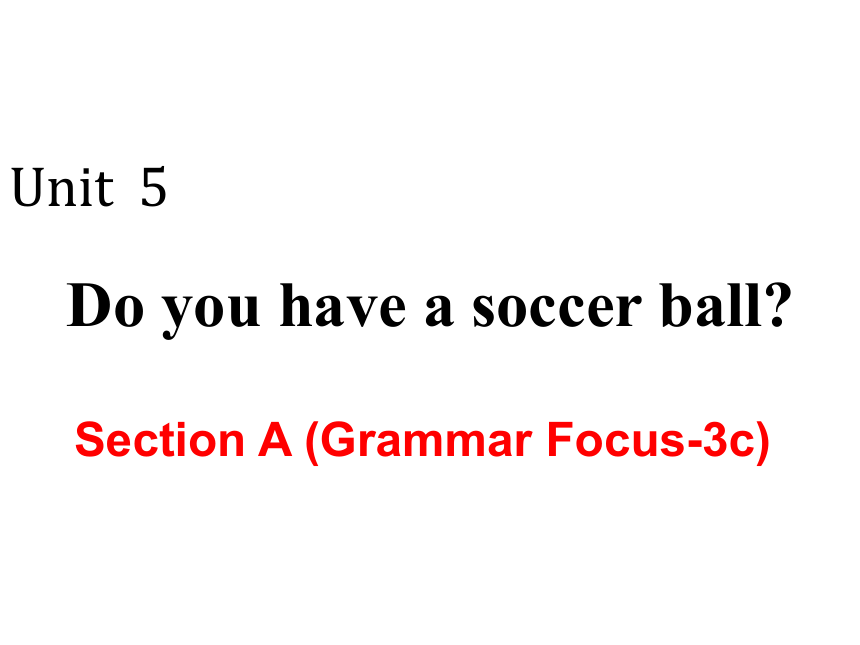
|
|
| 格式 | zip | ||
| 文件大小 | 2.4MB | ||
| 资源类型 | 教案 | ||
| 版本资源 | 人教新目标(Go for it)版 | ||
| 科目 | 英语 | ||
| 更新时间 | 2018-11-12 00:00:00 | ||
图片预览

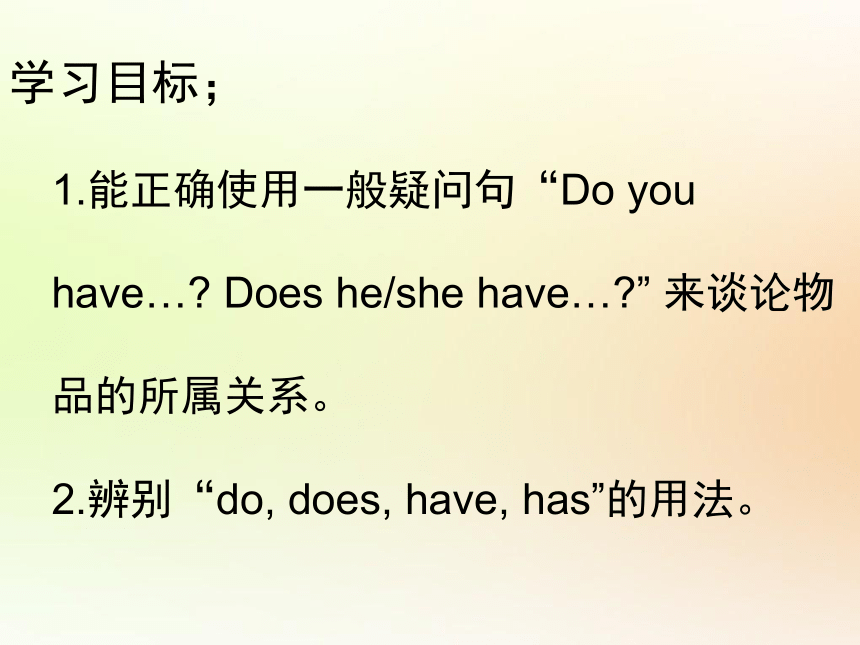
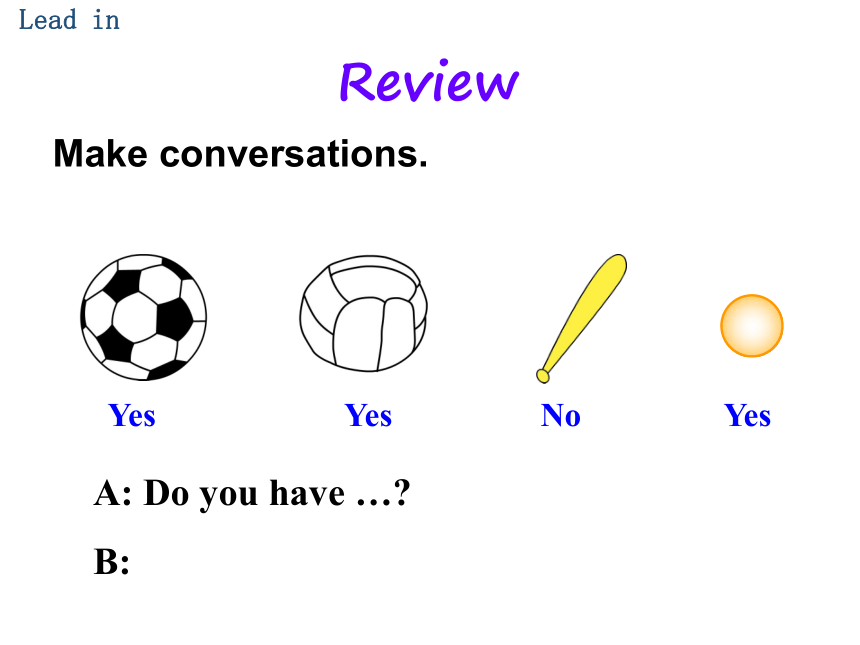
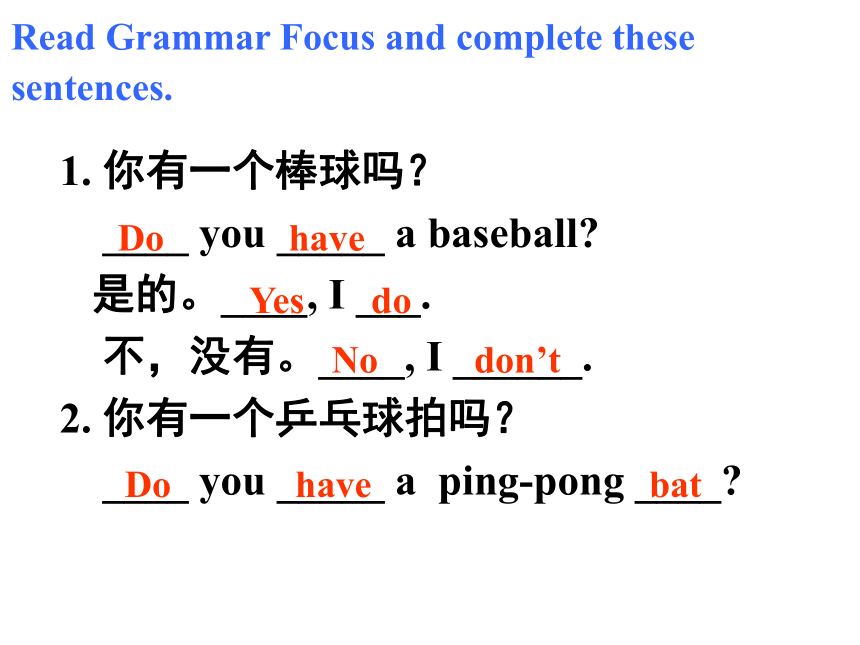
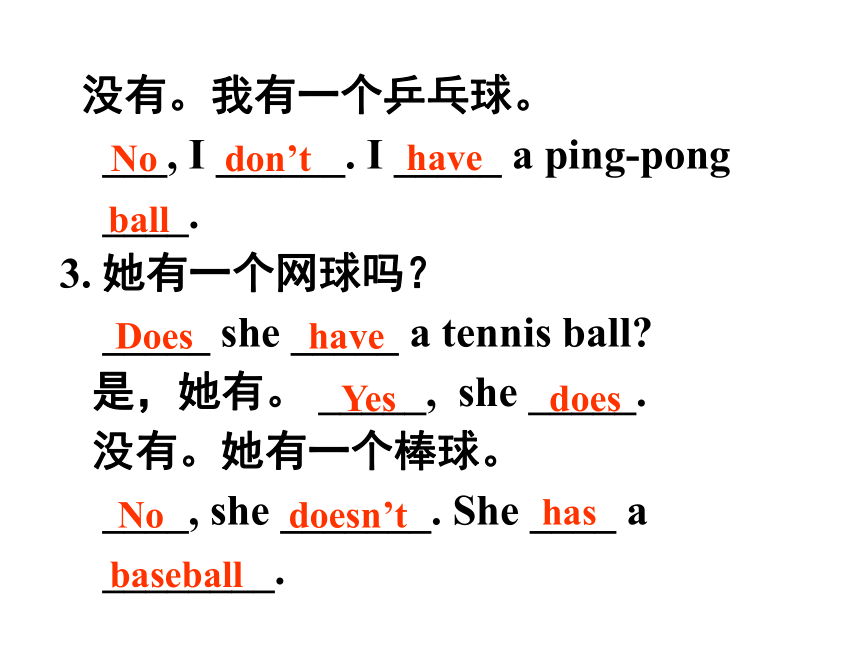
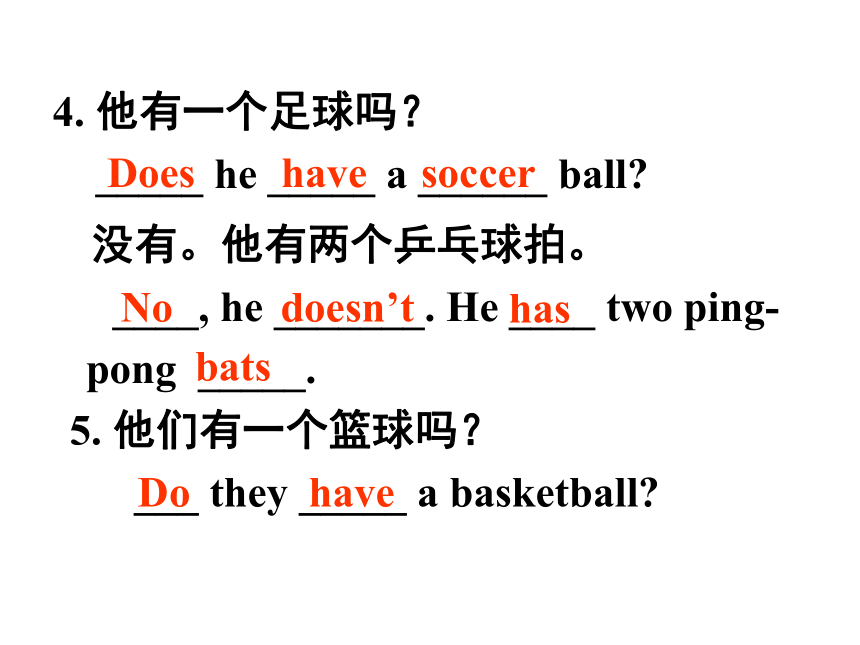
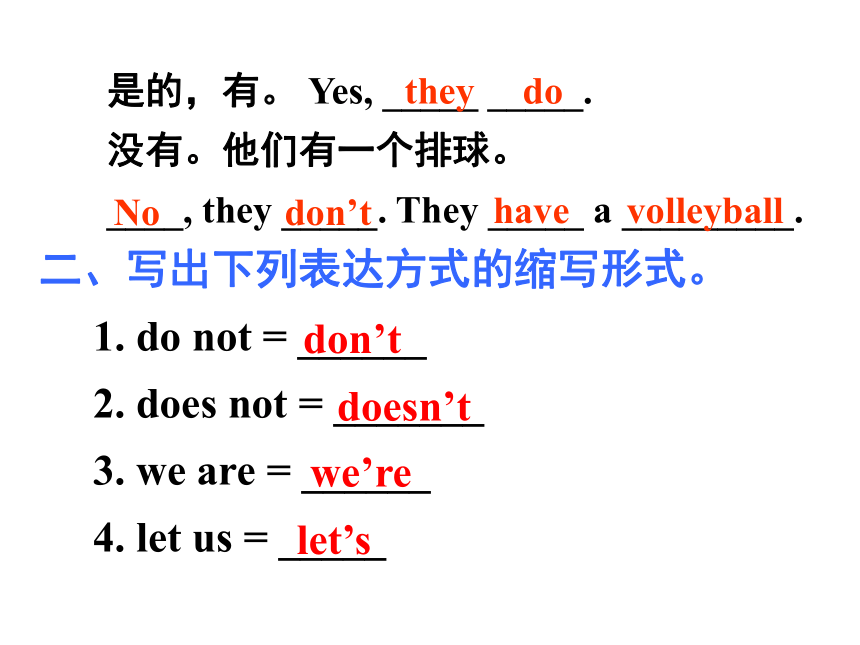
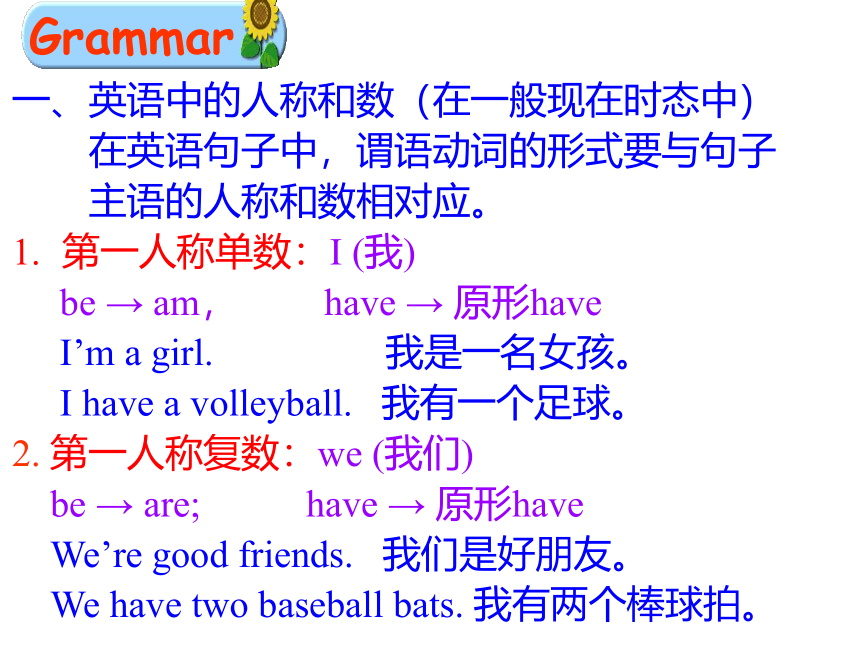
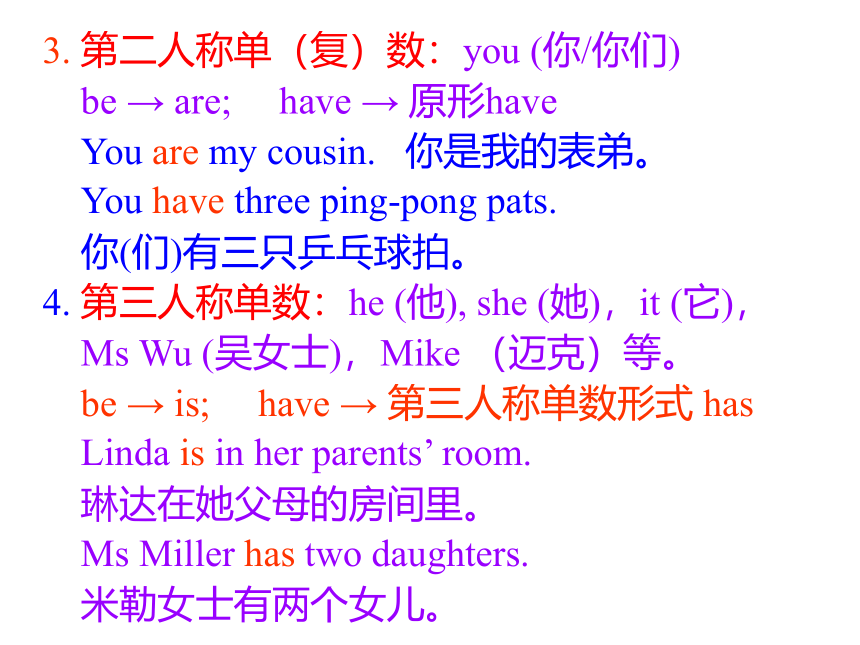
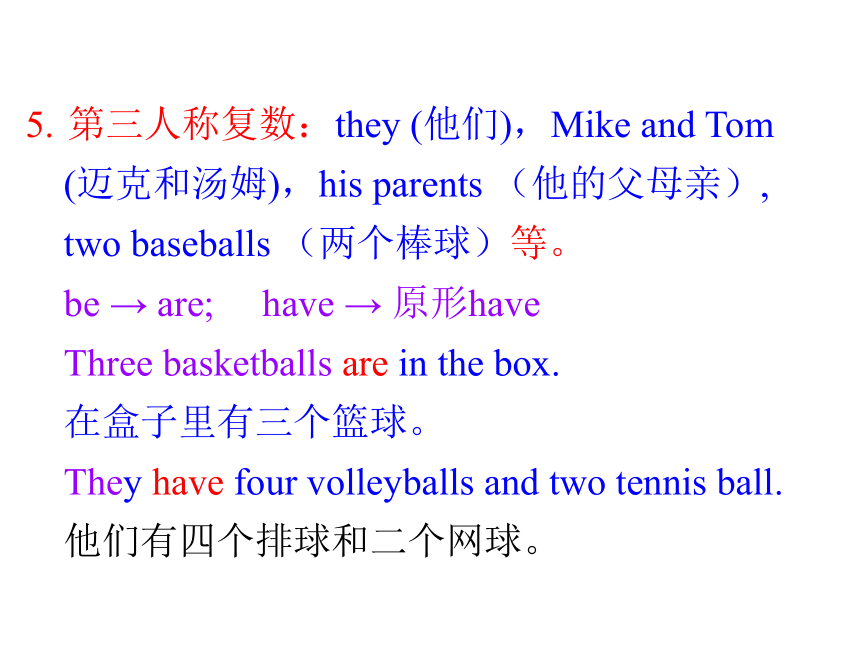
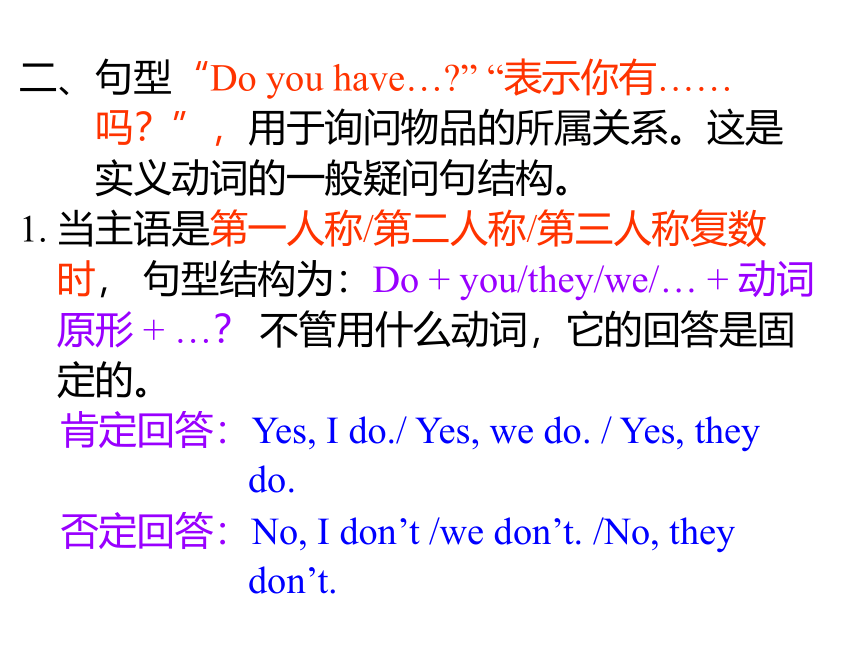
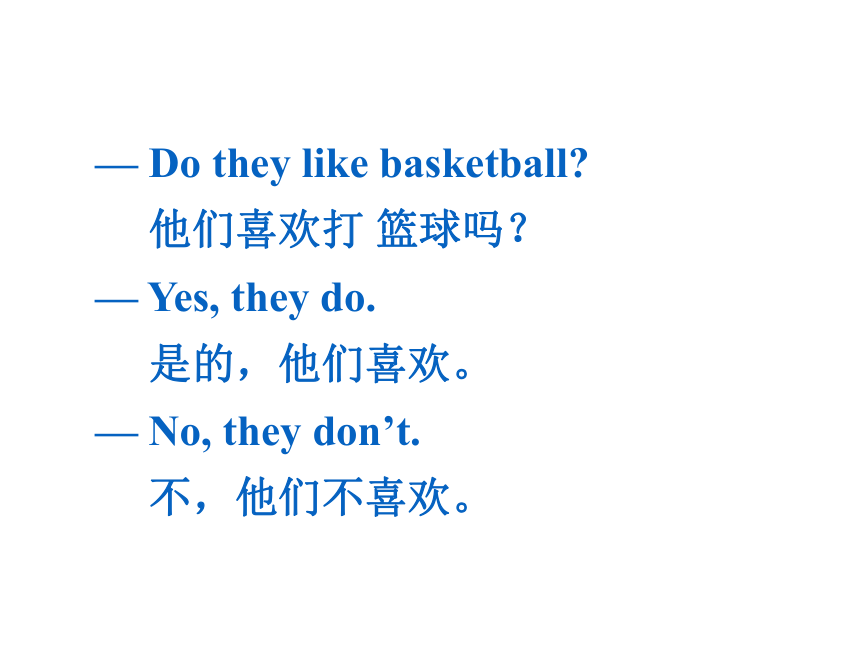
文档简介
Section A (Grammar Focus-3c)
七年级英语上(RJ)
教学课件
Unit 5
Do you have a soccer ball?
学习目标;
能正确使用一般疑问句“Do you have…? Does he/she have…?” 来谈论物品的所属关系。
辨别“do, does, have, has”的用法。
A: Do you have …?
B:
Yes
Yes
Yes
No
Make conversations.
Lead in
Review
1. 你有一个棒球吗?
____ you _____ a baseball?
是的。____, I ___.
不,没有。____, I ______.
2. 你有一个乒乓球拍吗?
____ you _____ a ping-pong ____?
Do have
Do have bat
Yes do
Read Grammar Focus and complete these sentences.
No don’t
没有。我有一个乒乓球。
___, I ______. I _____ a ping-pong
____.
3. 她有一个网球吗?
_____ she _____ a tennis ball?
是,她有。 _____, she _____.
没有。她有一个棒球。
____, she _______. She ____ a
________.
Yes does
has
No doesn’t
Does have
have
No don’t
ball
baseball
没有。他有两个乒乓球拍。
____, he _______. He ____ two ping-pong _____.
5. 他们有一个篮球吗?
___ they _____ a basketball?
No doesn’t
has
Do have
4. 他有一个足球吗?
_____ he _____ a ______ ball?
Does have soccer
bats
二、写出下列表达方式的缩写形式。
1. do not = ______
2. does not = _______
3. we are = ______
4. let us = _____
don’t
doesn’t
we’re
let’s
是的,有。 Yes, _____ _____.
没有。他们有一个排球。
____, they _____. They _____ a _________.
they do
No don’t
have volleyball
一、英语中的人称和数(在一般现在时态中)
在英语句子中,谓语动词的形式要与句子
主语的人称和数相对应。
第一人称单数:I (我)
be → am, have → 原形have
I’m a girl. 我是一名女孩。
I have a volleyball. 我有一个足球。
2. 第一人称复数:we (我们)
be → are; have → 原形have
We’re good friends. 我们是好朋友。
We have two baseball bats. 我有两个棒球拍。
3. 第二人称单(复)数:you (你/你们)
be → are; have → 原形have
You are my cousin. 你是我的表弟。
You have three ping-pong pats.
你(们)有三只乒乓球拍。
4. 第三人称单数:he (他), she (她),it (它),
Ms Wu (吴女士),Mike (迈克)等。
be → is; have → 第三人称单数形式 has
Linda is in her parents’ room.
琳达在她父母的房间里。
Ms Miller has two daughters.
米勒女士有两个女儿。
第三人称复数:they (他们),Mike and Tom
(迈克和汤姆),his parents (他的父母亲),
two baseballs (两个棒球)等。
be → are; have → 原形have
Three basketballs are in the box.
在盒子里有三个篮球。
They have four volleyballs and two tennis ball.
他们有四个排球和二个网球。
二、句型“Do you have…?” “表示你有……
吗?”,用于询问物品的所属关系。这是
实义动词的一般疑问句结构。
1. 当主语是第一人称/第二人称/第三人称复数
时, 句型结构为:Do + you/they/we/… + 动词
原形 + …? 不管用什么动词,它的回答是固
定的。
肯定回答:Yes, I do./ Yes, we do. / Yes, they
do.
否定回答:No, I don’t /we don’t. /No, they
don’t.
— Do they like basketball?
他们喜欢打 篮球吗?
— Yes, they do.
是的,他们喜欢。
— No, they don’t.
不,他们不喜欢。
2. 当主语为第三人称单数时,句子结构改为: Does + he / she / it … + 动词原形 + …?
肯定回答:Yes, he does./Yes, she does./Yes,
it does.
否定回答:No, he doesn’t./No, she doesn’t /
No, it doesn’t.
— Does Jane have a new book?
简有一本新书吗?
— Yes, she does. 是的,她有。
— No, she doesn’t. 不,她没有。
英语句子中的人称和数
do
does
do
we
they
him
it
us
them
人称 汉语 主格 助动词 宾格
单数 第一人称 我 I me
第二人称 你 you you
第三人称 他,Eric等 he
她,Linda等 she her
它 it
复数 第一人称 我们
第二人称 你们 you you
第三人称 他们,它们
I
they
he
she
it
Eric
you
we
I he they you
we she it Eric
Write each word in the correct place
in the chart.
3a
do does
1. A: _____ you have a baseball?
B: Yes, I ____.
A: Great! I have a bat. Let’s play.
3b
Fill in the blanks with do or does. Then practice the conversations with your partner.
Do
do
第一(I)、二 (you)人称用do。
3. A: ____ your friends have a basketball?
B: Yes, they ____. They have two
basketballs.
A: Well, let’s play basketball.
B: That sounds good.
Do
do
第三人称复数(your friends, they)用do。
2. A: _____ John have a soccer ball?
B: No, he _____.
A: _____ he have a ping-pong bat?
B: Yes, he ______. I think he has a ping-pong ball, too.
A: Hmm … let’s ask.
Does
does
Does
does
第三人称单数(John, he)用does。
Remember the things in Bob’s room.
Then close your books and ask and
answer questions with a partner.
A: Does Bob have a soccer ball?
B: Yes, he does.
3c
Do you have a ….?
Yes, I do.
No, I don’t.
Does she have a … ?
Yes, she does.
No, she doesn’t.
doesn’t=does not
Does he have a … ?
Yes, he does.
No, he doesn’t.
Great! I have a bat.好极了!我有一根球棒。
用法详解
知识点
great /gre?t/ adj.美妙的;伟大的
great作形容词,在此处意为“美妙的”。
—Let's play volleyball.我们打排球吧。
—That sounds great.那听起来太棒了。
拓展延伸
great还可意为“伟大的”。
Lu Xun is a great person.鲁迅是一位伟大的人物。
Well ,let's play basketball.好,让我们去打篮球吧。
play /ple?/ v.参加(比赛或运动);玩耍
(1)play在此处是及物动词,意为“参加(比赛或运动)”,其后接表示球类运动的名词时,play与球类运动名词之间不加冠词。
He often plays volleyball after school.他放学后经常打排球。
(2)play作动词还可意为“玩耍”。常用短语:play with sb.和某人一起玩play with sth. 玩某物
Tom is playing with Sam. They are playing with a ball in the street.汤姆正在和萨姆一起玩。他们正在街上玩球。
用法详解
特别提醒
图解助记
play后接表示乐器的名词时,在乐器类名词前要加定冠词the。
Mario can play the piano.马里奥会弹钢琴。
【学以致用】
①Peter can play soccer ball, but he can’t play
violin.
A. the; the B. the; / C. /; the D. /; a
②The father often plays chess his son.
A. the; and B. the; with C. /; with D. /; and
典例
(烟台中考改编)—Do you often play_____ soccer with your friends?
—No, I don't like sports. I often play ______ piano(钢琴)in my free time.
A. a;the B. the;/
C. / ;the D. the;a
解析:play soccer意为“踢足球”,中间不加任何冠词;play the piano意为“弹钢琴”,中间要加定冠词the。答案C
That sounds good.那听起来不错。
sound /sa?nd/ v.听起来好像
用法详解
sound此处作连系动词,意为“听起来好像”,后常接形容词作表语。That sounds interesting.那听起来很有趣。
1
拓展延伸 常见的感官动词
典例
(鄂州中考)—Do you know the song Where has the time gone?
—Sure. It ____beautiful. I like it a lot.
A. smells B. tastes C. sounds D. looks
解析
句意:“你知道《时间都去哪儿了》这首歌吗?”“当然。它听起来很美。我很喜欢它。”由问句中的song(歌曲)一词可知应选C项。答案C
知识点2
That sounds good.
用法详解
这是一个“主语+系动词+表语”结构的简单句。that指代上文所提的建议,作主语,系动词sound要用第三人称单数形式sounds。这个句子表示赞成对方所提的建议。类似的表达有"That sounds like a good idea."或"Sounds great/fun/interesting!"等。
—How about going to the zoo? 去动物园怎么样?
—Sounds great! 听起来很棒!
【学以致用】
—Let’s play volleyball.
—That sounds .
A. well B. good C. great D. B and C
典例
(连云港中考)—What about going to Shanghai Disneyland Park next month, Harry?
—______ !We'll have a lot of fun there.
A. Good luck B .Never mind C. Sounds great D. Certainly not
解析:句意:—哈里,下个月去上海迪士尼乐园怎么样? —听起来很棒!我们会在那儿玩得很开心。从“会在那儿玩得很开心”可知,答话人同意对方的提议。答案C
Ⅳ.用所给词的正确形式填空
1. That ________(sound)interesting.
2. ____ you ______(have) a tennis racket?
3. My brother ______(have) a baseball bat.
4. We have many _______(club) in our school.
5. Let’s watch _______(they) on TV.
sounds
Do
have
has
clubs
them
6. She ________(play) sports every day.
7. Can you _______(bring) your new
picture books here?
8. ________ your friend _______(like) sports?
9. Let ______(we) play tennis.
10.That’s an ___________(interest)
computer game.
plays
bring
Does
like
us
interesting
I ____ a basketball, I like playing basketball.
Because it can make me strong. Li Ming ____ a
soccer ball, but he ____________ a ping-pong
ball. Fangfang _____ a volleyball. Wang Ling
has a baseball.
Ⅴ. Fill in the blanks
have
has
doesn’t have
has
三、句型转换
1. I have a baseball bat. (改为一般疑问句)
_______ _______ _______ a baseball bat?
2. My brother has a soccer ball. (改为一般疑问句)
_____ your brother ______ a soccer ball?
3. Do your friends have a volleyball? (作肯定回答)
_______, _______ ____.
4. Does Mr. Smith have a brother? (作否定回答)
______, _____ _______.
5. My hat is on the chair. (对划线部分提问)
_______ ______ _____ hat?
Do you have
Does have
Yes they do
No he doesn’t
Where is my
七年级英语上(RJ)
教学课件
Unit 5
Do you have a soccer ball?
学习目标;
能正确使用一般疑问句“Do you have…? Does he/she have…?” 来谈论物品的所属关系。
辨别“do, does, have, has”的用法。
A: Do you have …?
B:
Yes
Yes
Yes
No
Make conversations.
Lead in
Review
1. 你有一个棒球吗?
____ you _____ a baseball?
是的。____, I ___.
不,没有。____, I ______.
2. 你有一个乒乓球拍吗?
____ you _____ a ping-pong ____?
Do have
Do have bat
Yes do
Read Grammar Focus and complete these sentences.
No don’t
没有。我有一个乒乓球。
___, I ______. I _____ a ping-pong
____.
3. 她有一个网球吗?
_____ she _____ a tennis ball?
是,她有。 _____, she _____.
没有。她有一个棒球。
____, she _______. She ____ a
________.
Yes does
has
No doesn’t
Does have
have
No don’t
ball
baseball
没有。他有两个乒乓球拍。
____, he _______. He ____ two ping-pong _____.
5. 他们有一个篮球吗?
___ they _____ a basketball?
No doesn’t
has
Do have
4. 他有一个足球吗?
_____ he _____ a ______ ball?
Does have soccer
bats
二、写出下列表达方式的缩写形式。
1. do not = ______
2. does not = _______
3. we are = ______
4. let us = _____
don’t
doesn’t
we’re
let’s
是的,有。 Yes, _____ _____.
没有。他们有一个排球。
____, they _____. They _____ a _________.
they do
No don’t
have volleyball
一、英语中的人称和数(在一般现在时态中)
在英语句子中,谓语动词的形式要与句子
主语的人称和数相对应。
第一人称单数:I (我)
be → am, have → 原形have
I’m a girl. 我是一名女孩。
I have a volleyball. 我有一个足球。
2. 第一人称复数:we (我们)
be → are; have → 原形have
We’re good friends. 我们是好朋友。
We have two baseball bats. 我有两个棒球拍。
3. 第二人称单(复)数:you (你/你们)
be → are; have → 原形have
You are my cousin. 你是我的表弟。
You have three ping-pong pats.
你(们)有三只乒乓球拍。
4. 第三人称单数:he (他), she (她),it (它),
Ms Wu (吴女士),Mike (迈克)等。
be → is; have → 第三人称单数形式 has
Linda is in her parents’ room.
琳达在她父母的房间里。
Ms Miller has two daughters.
米勒女士有两个女儿。
第三人称复数:they (他们),Mike and Tom
(迈克和汤姆),his parents (他的父母亲),
two baseballs (两个棒球)等。
be → are; have → 原形have
Three basketballs are in the box.
在盒子里有三个篮球。
They have four volleyballs and two tennis ball.
他们有四个排球和二个网球。
二、句型“Do you have…?” “表示你有……
吗?”,用于询问物品的所属关系。这是
实义动词的一般疑问句结构。
1. 当主语是第一人称/第二人称/第三人称复数
时, 句型结构为:Do + you/they/we/… + 动词
原形 + …? 不管用什么动词,它的回答是固
定的。
肯定回答:Yes, I do./ Yes, we do. / Yes, they
do.
否定回答:No, I don’t /we don’t. /No, they
don’t.
— Do they like basketball?
他们喜欢打 篮球吗?
— Yes, they do.
是的,他们喜欢。
— No, they don’t.
不,他们不喜欢。
2. 当主语为第三人称单数时,句子结构改为: Does + he / she / it … + 动词原形 + …?
肯定回答:Yes, he does./Yes, she does./Yes,
it does.
否定回答:No, he doesn’t./No, she doesn’t /
No, it doesn’t.
— Does Jane have a new book?
简有一本新书吗?
— Yes, she does. 是的,她有。
— No, she doesn’t. 不,她没有。
英语句子中的人称和数
do
does
do
we
they
him
it
us
them
人称 汉语 主格 助动词 宾格
单数 第一人称 我 I me
第二人称 你 you you
第三人称 他,Eric等 he
她,Linda等 she her
它 it
复数 第一人称 我们
第二人称 你们 you you
第三人称 他们,它们
I
they
he
she
it
Eric
you
we
I he they you
we she it Eric
Write each word in the correct place
in the chart.
3a
do does
1. A: _____ you have a baseball?
B: Yes, I ____.
A: Great! I have a bat. Let’s play.
3b
Fill in the blanks with do or does. Then practice the conversations with your partner.
Do
do
第一(I)、二 (you)人称用do。
3. A: ____ your friends have a basketball?
B: Yes, they ____. They have two
basketballs.
A: Well, let’s play basketball.
B: That sounds good.
Do
do
第三人称复数(your friends, they)用do。
2. A: _____ John have a soccer ball?
B: No, he _____.
A: _____ he have a ping-pong bat?
B: Yes, he ______. I think he has a ping-pong ball, too.
A: Hmm … let’s ask.
Does
does
Does
does
第三人称单数(John, he)用does。
Remember the things in Bob’s room.
Then close your books and ask and
answer questions with a partner.
A: Does Bob have a soccer ball?
B: Yes, he does.
3c
Do you have a ….?
Yes, I do.
No, I don’t.
Does she have a … ?
Yes, she does.
No, she doesn’t.
doesn’t=does not
Does he have a … ?
Yes, he does.
No, he doesn’t.
Great! I have a bat.好极了!我有一根球棒。
用法详解
知识点
great /gre?t/ adj.美妙的;伟大的
great作形容词,在此处意为“美妙的”。
—Let's play volleyball.我们打排球吧。
—That sounds great.那听起来太棒了。
拓展延伸
great还可意为“伟大的”。
Lu Xun is a great person.鲁迅是一位伟大的人物。
Well ,let's play basketball.好,让我们去打篮球吧。
play /ple?/ v.参加(比赛或运动);玩耍
(1)play在此处是及物动词,意为“参加(比赛或运动)”,其后接表示球类运动的名词时,play与球类运动名词之间不加冠词。
He often plays volleyball after school.他放学后经常打排球。
(2)play作动词还可意为“玩耍”。常用短语:play with sb.和某人一起玩play with sth. 玩某物
Tom is playing with Sam. They are playing with a ball in the street.汤姆正在和萨姆一起玩。他们正在街上玩球。
用法详解
特别提醒
图解助记
play后接表示乐器的名词时,在乐器类名词前要加定冠词the。
Mario can play the piano.马里奥会弹钢琴。
【学以致用】
①Peter can play soccer ball, but he can’t play
violin.
A. the; the B. the; / C. /; the D. /; a
②The father often plays chess his son.
A. the; and B. the; with C. /; with D. /; and
典例
(烟台中考改编)—Do you often play_____ soccer with your friends?
—No, I don't like sports. I often play ______ piano(钢琴)in my free time.
A. a;the B. the;/
C. / ;the D. the;a
解析:play soccer意为“踢足球”,中间不加任何冠词;play the piano意为“弹钢琴”,中间要加定冠词the。答案C
That sounds good.那听起来不错。
sound /sa?nd/ v.听起来好像
用法详解
sound此处作连系动词,意为“听起来好像”,后常接形容词作表语。That sounds interesting.那听起来很有趣。
1
拓展延伸 常见的感官动词
典例
(鄂州中考)—Do you know the song Where has the time gone?
—Sure. It ____beautiful. I like it a lot.
A. smells B. tastes C. sounds D. looks
解析
句意:“你知道《时间都去哪儿了》这首歌吗?”“当然。它听起来很美。我很喜欢它。”由问句中的song(歌曲)一词可知应选C项。答案C
知识点2
That sounds good.
用法详解
这是一个“主语+系动词+表语”结构的简单句。that指代上文所提的建议,作主语,系动词sound要用第三人称单数形式sounds。这个句子表示赞成对方所提的建议。类似的表达有"That sounds like a good idea."或"Sounds great/fun/interesting!"等。
—How about going to the zoo? 去动物园怎么样?
—Sounds great! 听起来很棒!
【学以致用】
—Let’s play volleyball.
—That sounds .
A. well B. good C. great D. B and C
典例
(连云港中考)—What about going to Shanghai Disneyland Park next month, Harry?
—______ !We'll have a lot of fun there.
A. Good luck B .Never mind C. Sounds great D. Certainly not
解析:句意:—哈里,下个月去上海迪士尼乐园怎么样? —听起来很棒!我们会在那儿玩得很开心。从“会在那儿玩得很开心”可知,答话人同意对方的提议。答案C
Ⅳ.用所给词的正确形式填空
1. That ________(sound)interesting.
2. ____ you ______(have) a tennis racket?
3. My brother ______(have) a baseball bat.
4. We have many _______(club) in our school.
5. Let’s watch _______(they) on TV.
sounds
Do
have
has
clubs
them
6. She ________(play) sports every day.
7. Can you _______(bring) your new
picture books here?
8. ________ your friend _______(like) sports?
9. Let ______(we) play tennis.
10.That’s an ___________(interest)
computer game.
plays
bring
Does
like
us
interesting
I ____ a basketball, I like playing basketball.
Because it can make me strong. Li Ming ____ a
soccer ball, but he ____________ a ping-pong
ball. Fangfang _____ a volleyball. Wang Ling
has a baseball.
Ⅴ. Fill in the blanks
have
has
doesn’t have
has
三、句型转换
1. I have a baseball bat. (改为一般疑问句)
_______ _______ _______ a baseball bat?
2. My brother has a soccer ball. (改为一般疑问句)
_____ your brother ______ a soccer ball?
3. Do your friends have a volleyball? (作肯定回答)
_______, _______ ____.
4. Does Mr. Smith have a brother? (作否定回答)
______, _____ _______.
5. My hat is on the chair. (对划线部分提问)
_______ ______ _____ hat?
Do you have
Does have
Yes they do
No he doesn’t
Where is my
同课章节目录
- starters 预备篇(2012秋审查)
- Unit 1 Good morning !
- Unit 2 What’s this in English?
- Unit 3 What color is it ?
- Unit 1 My name's Gina.
- Section A
- Section B
- Unit 2 This is my sister.
- Section A
- Section B
- Unit 3 Is this your pencil?
- Section A
- Section B
- Unit 4 Where's my schoolbag?
- Section A
- Section B
- Unit 5 Do you have a soccer ball?
- Section A
- Section B
- Unit 6 Do you like bananas?
- Section A
- Section B
- Unit 7 How much are these socks?
- Section A
- Section B
- Unit 8 When is your birthday?
- Section A
- Section B
- Unit 9 My favorite subject is science.
- Section A
- Section B
